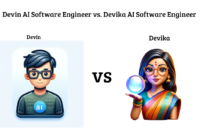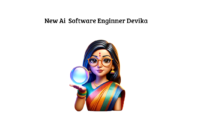The world of game development is a captivating realm that beckons creative minds to bring their imaginations to life through interactive experiences. Whether you aspire to create indie games with unique storytelling or work on blockbuster AAA titles with cutting-edge graphics, becoming a game developer opens doors to a diverse and dynamic industry. In this comprehensive guide, we will take you on a journey through the exciting path of game development. From mastering programming languages and game engines to understanding game design principles and collaborating with multidisciplinary teams, this guide will provide you with a step-by-step roadmap to becoming a skilled and successful game developer. So, let’s embark on this thrilling adventure and learn how to turn your passion for gaming into a rewarding career in game development.
Understanding the Game Development Landscape:
The first step in your journey is to grasp the various facets of the game development industry. Game development encompasses a wide range of roles and responsibilities, with diverse opportunities to explore. As a game developer, you can specialize in different areas such as game design, programming, art, animation, sound design, and more. The industry caters to various platforms, including PC, consoles, mobile devices, and virtual reality (VR) platforms.
While AAA game development involves large teams and significant resources, indie game development allows individual creators or small teams to showcase their creativity with unique and innovative ideas. Before diving into specific roles, take the time to research the different aspects of game development and identify the areas that align with your interests and skills.
Mastering Programming for Game Development:
Programming is the backbone of game development, and having strong coding skills is essential for aspiring game developers. The choice of programming language often depends on the game engine you use. For example, C# is commonly used with Unity, while C++ is prevalent in Unreal Engine.
Beginners should focus on learning the fundamentals of programming, including data structures, algorithms, and object-oriented programming. As you progress, delve into more advanced topics such as game physics, artificial intelligence (AI), and optimization techniques.
Online tutorials, courses, and books are valuable resources to accelerate your learning. Additionally, consider working on small coding projects or contributing to open-source game projects to gain practical experience and build a portfolio of your work.
Choosing the Right Game Engine and Tools:
A game engine is a software framework that simplifies the game development process by providing essential tools and functionalities. The choice of a game engine significantly impacts your development workflow and the types of games you can create.
Unity and Unreal Engine are two of the most popular and widely used game engines. Unity is known for its ease of use and cross-platform support, making it ideal for beginners and indie developers. Unreal Engine, on the other hand, is renowned for its stunning graphics and robust capabilities, making it a favorite among AAA developers.
Before selecting a game engine, consider factors such as your target platforms, budget, community support, and the type of games you wish to create. Experiment with different engines to find the one that best suits your needs and aligns with your game development goals.
Understanding Game Design Principles:
Game design is the process of crafting the gameplay, mechanics, and overall experience of a game. It involves creating engaging and immersive player interactions that keep players entertained and invested in the game world.
Familiarize yourself with game design principles such as player motivation, game loops, player feedback, and level design. Study existing games from different genres to understand how design choices influence player experiences.
As a game developer, understanding game design is vital, even if you specialize in programming or art. Collaboration between developers and game designers is essential for creating cohesive and enjoyable games.
Creating Stunning Game Art and Animation:
Game art and animation play a crucial role in defining the visual identity and atmosphere of a game. Artists and animators bring characters, environments, and objects to life, captivating players and immersing them in the game world.
If you have artistic talent, explore different art styles such as 2D pixel art, hand-drawn illustrations, or 3D modeling. Artists can use software like Adobe Photoshop, Blender, or Maya to create game assets.
For animators, mastering animation principles like timing, squash and stretch, and anticipation is essential. Tools like Spine, DragonBones, or Unity’s animation system can aid in creating dynamic and fluid character animations.
Implementing Sound and Music:
Sound effects and music contribute significantly to the overall atmosphere and emotional impact of a game. Sound designers use audio effects to enhance interactions and create immersive environments. Composers and musicians create original soundtracks that complement the game’s narrative and gameplay.
Explore sound design techniques to add depth and realism to your game. Invest in a good-quality microphone and recording equipment to capture original sound effects.
For music composition, learn music theory and experiment with different instruments and melodies. Tools like FL Studio, Ableton Live, or Logic Pro are commonly used for music production.
Game Development Project Management:
Game development involves complex tasks and coordination among team members. Effective project management ensures that the development process runs smoothly, deadlines are met, and potential issues are addressed promptly.
Consider adopting agile development methodologies like Scrum or Kanban to manage tasks and prioritize features. Use project management tools like Jira, Trello, or Asana to track progress and collaborate with team members.
Version control systems like Git are essential for managing changes to the game’s source code and assets. Collaborating on Git repositories allows team members to work simultaneously on different parts of the project.
Creating Your First Game: A Step-by-Step Tutorial:
To put your skills into practice, embark on creating your first game. Start with a simple project that aligns with your skill level and gradually add complexity as you gain confidence.
Follow online tutorials or courses that guide you through the game development process. YouTube and various game development websites offer a wealth of tutorials covering various aspects of game development.
As you work on your first game, remember that it’s normal to encounter challenges and roadblocks. Problem-solving and learning from mistakes are crucial aspects of the game development journey.
Game Testing and Quality Assurance:
Testing is a critical phase of game development, ensuring that the game runs smoothly and is free of bugs and glitches. Quality assurance (QA) involves rigorous testing of all aspects of the game to identify and fix issues before release.
Perform regular playtesting throughout the development process to gather feedback from players. Analyze their experiences and adjust the game’s mechanics, difficulty, or pacing accordingly.
Enlist the help of beta testers to get valuable feedback from a broader audience. Encourage them to report any bugs or issues they encounter during gameplay.
Networking and Collaboration in the Game Development Community:
Networking and collaboration are essential aspects of the game development industry. Engage with the game development community through online forums, social media groups, and game development events.
Participate in game jams, hackathons, and industry conferences to meet like-minded individuals and potential collaborators. Game jams provide excellent opportunities to work on small projects within a limited timeframe, honing your skills and creativity.
Collaboration with other developers, artists, and sound designers can lead to exciting projects and foster a supportive and creative environment.
Game Monetization and Publishing:
If your goal is to publish your game and make it accessible to players, you need to consider various monetization models. The most common models include in-app purchases, ads, subscriptions, and one-time purchases.
Understand the advantages and disadvantages of each model and choose the one that aligns with your game’s design and target audience.
Decide on the platforms where you plan to publish your game. Popular options include app stores for mobile games, digital distribution platforms like Steam for PC games, and console platforms.
Each platform has specific requirements and guidelines for game submission. Ensure that your game meets the platform’s criteria before submitting it for review.
Continuing Education and Skill Enhancement:
The game development industry is constantly evolving, with new technologies and trends emerging regularly. To stay relevant and competitive, embrace lifelong learning and keep up with industry advancements.
Enroll in online courses, attend workshops, and read industry publications to expand your skill set. Learning new programming languages, game engines, or art techniques can open doors to exciting opportunities.
Additionally, take the time to explore emerging technologies such as virtual reality (VR), augmented reality (AR), or machine learning, as they present new possibilities for game development.
Building a Game Developer Portfolio:
A well-curated portfolio showcases your skills, creativity, and versatility as a game developer. Assemble a collection of your best game projects, including screenshots, gameplay videos, and descriptions.
Consider creating a personal website to host your portfolio. A website allows you to showcase your work professionally and makes it easy for potential employers or collaborators to access your projects.
Ensure that your portfolio is visually appealing and easy to navigate. Organize your projects into categories, such as 2D games, 3D games, or game prototypes.
Internships and Industry Experience:
If you’re serious about pursuing game development as a career, consider seeking internships or entry-level positions in game development studios. Industry experience provides valuable insights into the professional game development process and exposes you to real-world projects and challenges.
Internships can be a stepping stone to full-time employment, as they allow you to build connections within the industry and demonstrate your skills and work ethic.
Exploring Game Genres and Niche Development:
The game development industry offers a wide variety of genres, each catering to different player preferences. Explore different game genres, including action, adventure, puzzle, simulation, strategy, and more.
Consider niche development, where you focus on creating games for specific target audiences or unique gameplay experiences. Niche games can find dedicated audiences and provide opportunities for creative experimentation.
Staying Inspired and Motivated:
Game development can be a challenging and demanding journey, requiring dedication and perseverance. It’s essential to find ways to stay inspired and motivated throughout the process.
Connect with a supportive community of game developers who can offer encouragement and advice. Celebrate your achievements, no matter how small, and remember that progress takes time.
Participate in game development challenges or personal projects that excite you. Passion projects can reignite your enthusiasm and remind you why you fell in love with game development in the first place.
Conclusion:
Becoming a game developer is a thrilling and rewarding journey that empowers you to craft interactive experiences that captivate players around the world. With a solid foundation in programming, game design, art, and sound, you have the tools to embark on this exciting career path.
Remember that game development is a continuous learning experience, with new technologies and trends shaping the industry’s future. Embrace lifelong learning, collaborate with fellow developers, and never stop experimenting with your creative ideas.
As you navigate the world of game development, stay passionate, persistent, and open to growth. Your dedication and creativity can lead you to create unforgettable gaming experiences that leave a lasting impact on players everywhere. So, embrace the challenges and rewards of game development, and let your dreams take flight in the realm of interactive entertainment. Happy game developing!





